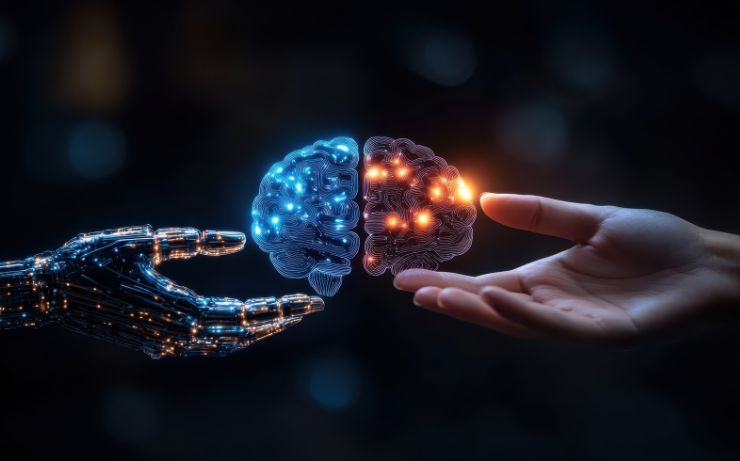This week we explore a powerful question about artificial intelligence and our humanity, reflecting on the uniquely human qualities we might intentionally nurture as AI reshapes our communication, work, and relationships. Join us as we consider why preserving our humanity could become our greatest challenge and opportunity in the age of AI.

OCTOBER 24, 2025
Recently, I had a conversation with a dear friend about artificial intelligence. Although I love exploring how AI can make my business more efficient so I can spend more time on my human relationships, the conversation turned to how AI could change our experience of being human.
Long after this conversation ended, one question stayed with me.
In my own use of AI, I often feel frustrated. The technology is undeniably helpful for generating ideas or organizing and analyzing tasks. But the resulting text mostly seems generic and predictable.
I can tell as soon as I read a piece online whether it was written by AI or not. Something vital is lost in it. The language is grammatically correct and sounds “good”, but it lacks the depth that we add naturally when we communicate from lived experience.
This frustration led me to reflect more deeply.
If our communications increasingly rely on AI-generated content, what impact will this have on our interactions and our ability to connect?
Human communication goes beyond words and ideas. It includes emotions, intuition, and embodied presence. When our content lacks these elements, what are we losing?
My experience working with real human beings has shown me that we don't respond to polished perfection as much as we respond to human authenticity.
We resonate with shared experiences, emotional depth, and vulnerability. These are precisely the elements AI struggles to replicate, no matter how sophisticated it becomes.
Perhaps the real challenge AI presents isn't technological, but human.
As AI grows more integrated into our lives, holding on to our human qualities becomes increasingly important. Creativity, emotional intelligence, intuition, and the depth of our presence are uniquely human traits.
They can't be produced algorithmically, at least not in a way that truly resonates.
In business and leadership, the push toward efficiency and scale often prioritizes technology over human connection. But human connection remains central to wellbeing and genuine impact.
Without careful attention, the emphasis on efficiency risks slowly erasing our capacity for authentic living and connection.
Having said that, I don’t believe we need to reject AI. But I believe we need to remain aware of what technology simply can’t (and shouldn’t) replace.
This awareness matters deeply for our relationships, our work, and how we see ourselves. If we allow the algorithm to dictate our interactions and communication, our humanity will slowly fade into the ether, and we will start to sound like AI chat bots.
The whole issue becomes so abundantly clear in my podcast interviews. AI could easily write questions, create a script for me, and help me interview my guests. But the strength of these conversations doesn’t lie in any of this AI-generated content.
What lights me up is the curiosity, spontaneous laughter, reflection, the back and forth banter, and the moments of real connection even though we are looking at each other through a screen.
I can absolutely tell when I asked a question that deeply affected my guest and they are sharing from a place of vulnerability and authenticity. And so can our listeners. None of these interactions would be the same if an AI bot narrated my podcast.
Realizing this highlighted the inherent risk of depending too heavily on technology for the human essence of our interactions.
Efficiency matters, but meaningful impact doesn’t come from efficiency alone. It unfolds naturally from empathy, emotional responsiveness, and shared human experiences.
I don't have a solution to the complexities AI brings.
But I do sense that protecting our humanity begins with staying conscious of what technology is unable to provide. It requires intentionally nurturing what makes us fundamentally human, including our creativity, emotional depth, and genuine connection.
As AI continues transforming our workplaces and relationships, I invite you to reflect: How can we consciously preserve the depth and authenticity of our humanity?
Because ultimately, staying human might prove to be our greatest challenge and greatest opportunity in the age of AI.

By Petra Brunnbauer
Petra Brunnbauer is an award-winning Mind-Body Coach, founder of The Jōrni®, host of the globally-ranked Jōrni Podcast, and author of The Functional Freeze Formula™. With a Master’s in Psychology and as a doctoral student in Mind-Body Medicine, Petra is committed to advancing holistic approaches to health and healing.

